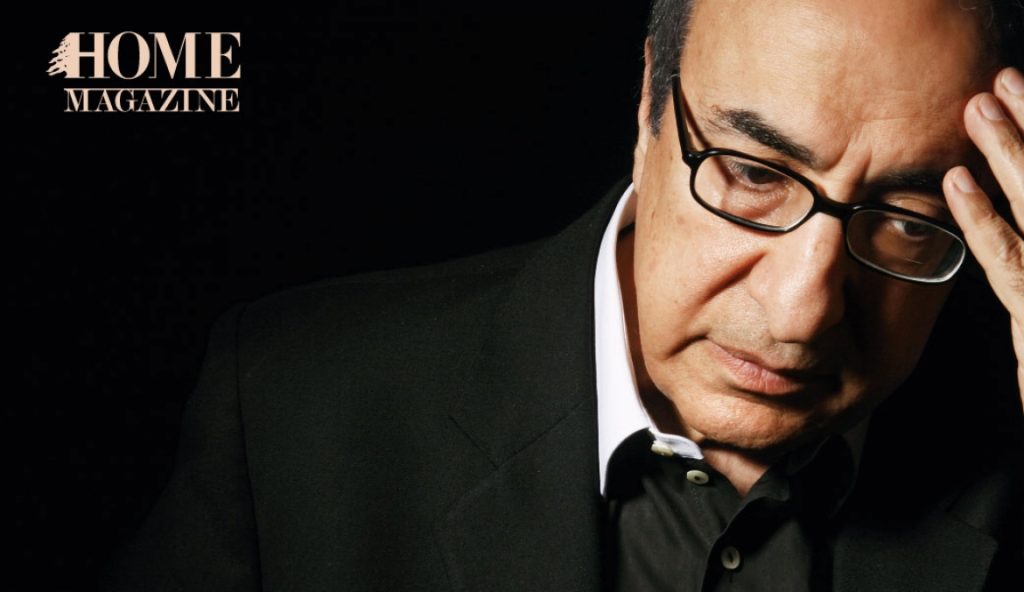Sitting in a chair in a gently lit corner of his living room, the last living member of the Rahbani Brothers still enjoys humming his own melodies, the very melodies that spoke to our hearts and stuck in our minds forever. Although not loud in his discourse, he is powerful in his achievements. Elias Rahbani shared with HOME his favorite anecdotes, from when he was first introduced to music inside his mother’s womb to what keeps him going strong at 78.
The First Notes of Rahbani’s Life Symphony
Rahbani’s love for music was inherited from his mother, who would frequently listen to French classics, and developed with him listening to French soldiers clients humming their songs at his father’s restaurant in Antelias as a kid. Little did he know he would one day grow up to become the musical ambassador for French songs in his HOME country.
Growing up, his older brothers Assi and Mansour saw his talent and insisted that he learnt from the best French instructors. He studied piano and composition with Bertrand Robillard for four years and later under virtuoso pianist Michel Bourgeot with whom he trained with for eight years. “Bourgeot was such an exceptional musician from whom I learnt a lot. And although he did not compose his own music, no one could play the piano like him,” Rahbani told HOME.
At the age of 18, he composed 11 pieces of classical music and started a new wave of French chanson interpreted by Lebanese artists with songs like ‘Je te jure’, ‘Que sera ma vie sans toi’, ‘Valse la valse’ and ‘La dernière danse’ among others.
He was among the first Lebanese musicians to compose and arrange foreign music in the Arab region, and composed the “Hymne du Liban à la francophonie” with lyrics written by Jean-Claude Boulos for the 9th Francophonie Summit in 2002.
An Endless Library of Talent
Over the course of his career, Rahbani composed over 6,500 pieces of music, including more than 3,500 advertisement songs (who doesn’t recall the famous “Shou betariytak? Rayovac!” advert or “La vache qui rit” for instance?). “I was 19 years old when the BBC approached me to write 40 songs for them. That was my first salary, 400 L.L., and with that I bought my first ever Fiat,” he explained.
In addition to working for major international companies like Philips, Parlophone, Polydor Decca and Capitole, Rahbani served as the Musical Advisor for Recordings and Chief of the Occidental Music Section at Radio Lebanon between 1962 and 1972 and his music won prizes at a number of festivals including the International Song Festival of Athens in 1969, and the 19th International Festival of Publicity Film in Venice in 1972.
And while he does not follow a particular creative process, he firmly believes that inspiration comes from above and is not afraid to follow his intuition. Talking about his song Mory Mory, he recalled: “I was sitting with some friends in Bikfaya when Sammy Clark joined and asked me if I could write a song for him to compete with in Germany, I didn’t want to at first but then I sat in front of the piano and the melody came together in less than 6 minutes.”
“We then wrote the lyrics the next day and Sammy went to Germany in 1979, performed the song and it placed first in the competition,” he explained, adding that it is such moments of inspiration that make him believe in God, in the existence of a subtle voice inside that enlightens and inspires. “God and music go together like twins.”
“God and music go together like twins.”
On Lebanon and Belonging
When war broke out in Lebanon, Rahbani flew to Paris with his wife Nina and their two sons Jad and Ghassan. There he met prominent artistic director André Willemin who fell in love with his music and was thrilled to work with him. “By the time I was about to sign the contract, Mansour called me to make sure everything is okay, we miss you, he said to me.”
Que sera ma vie sans toi, que sera ma vie si tu pars
Pour un nouveau pays, pour une nouvelle vie
Et pour un autre amour et pour d’autres beaux jours
Que sera ma vie sans toi, Que sera ma vie si un soir
Au bord de cette mer, je cherche tes yeux verts
Et je ne trouve plus qu’ un souvenir perdu.

































